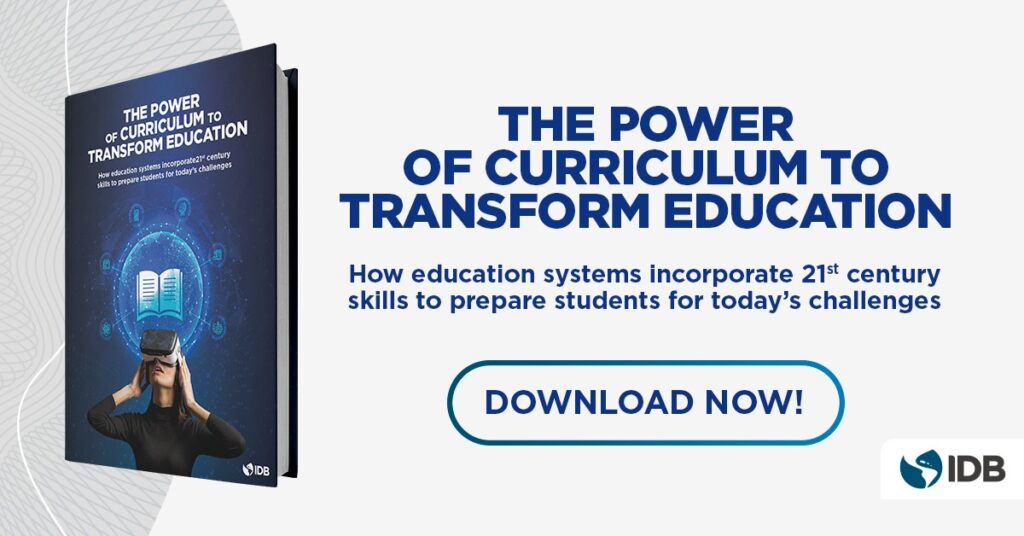Did you ever imagine witnessing the emergence of a pandemic and the science race for a vaccine to fight it? Technological, environmental, and demographic transformations are reshaping the way we navigate the world today. These challenges urge education systems to equip youth with the skills needed to thrive in complex and uncertain realities. The COVID-19 pandemic has deepened the vulnerabilities that youth in Latin America and the Caribbean (LAC) experience, especially the most disadvantaged. How education enables youth to learn 21st century skills and live to their fullest potential matters not only for the region’s economic future but also for equity.
Schooling can and should provide opportunities to develop skills beyond core content knowledge such as critical thinking, problem solving, and socioemotional skills. There is a robust body of evidence on the importance of soft skills for later-life outcomes. Interventions to boost non-cognitive skills have been shown to positively impact a wide range of educational and behavioral outcomes, in resource-constrained settings.
Youth are Severely Affected by Lack of Opportunities
In LAC, 24% of young people aged 15-24 are not in employment, education, or training, most of whom are women. Youth are disproportionally affected by unemployment: the rate of unemployment among young people in LAC is three times as high as the adult unemployment rate (ILO, 2020). These barriers, coupled with low participation in tertiary education, pose a challenge for the life trajectories of young people. The changing structure of employment will intensify the challenges young people face. The returns to social non-cognitive skills, which are complements to cognitive skills, are on the rise. Technological shifts will continue to drive job creation and displacement, negatively affecting workers in routine occupations the most.
Youth from disadvantaged backgrounds, overrepresented in routine occupations, will experience these disruptions as profound crises rather than opportunities.
How Does a 21st Century Skills Education Look Like?
There is a wide and increasing gap between what students learn in school and what the world demands. A 21st century education means equipping youth with the necessary digital, cognitive, executive function, and emotional skills that enable and empower them to navigate complex realities. Most education systems fall short in delivering these skills, that can be adapted and transferable to many contexts.
Closing foundational learning gaps and the 21st century skills agenda go hand in hand: it is not possible for students to learn critical thinking if they have not mastered mathematics and reading skills. In the same way, foundation skills benefit from strengthening critical thinking to construct knowledge. This is an area of large gaps: the results from PISA (2018) show that 91% of youth cannot distinguish between a fact and an opinion.
The losses brought up by the COVID-19 crisis are sizable. They are larger in magnitude for the most disadvantaged youth, calling attention to the importance of investing in mitigating such impact. The crisis has created a unique opportunity for governments and the larger education community to reimagine what skills students ought to learn at school and to leverage lessons from innovative approaches emerged during the pandemic.
An Unfinished Agenda: From Curricular Reform to Classroom Practices
What students learn at school and what type of competences they ought to master are reflected in curricular design. Hence, curricular reform is necessary to transform education systems to foster 21st century skills.
The process of curricular reform is complex: it requires alignment with the objectives of schooling. The experience of different countries around the world points out the importance of institutional capacity to lead and sustain reforms, as well as stakeholder engagement and ownership.
Although incorporating 21st century skills in the curriculum is a necessary step, it is by no means sufficient. Curricular reforms go beyond and involve ensuring that classroom practices reflect these changes. Addressing challenges on how to define and measure these skills is central to this task.
A growing body of evidence on interventions that can help to change behaviors in classroom and schools can aid in the process of translating curricular reforms to practice. For example:
- The current crisis has allowed EdTech powered innovations for more effective learning to be tested and implemented at scale.
- Other promising paths to bridge the gap between what students should learn and what they effectively learn include extending school hours to provide more varied learning opportunities
Equipping youth with 21st century skills to help them navigate and thrive in uncertain realities is an agenda we cannot longer postpone. The COVID-19 crisis has undermined the already limited opportunities available to youth in LAC, disproportionally so for the most disadvantaged. This context urges countries to revisit how they prepare their youth to face the old and rising challenges of the world we live in.
Want to learn more about 21st century skills development and the curriculum reforms that are moving in this direction? Download our publication: The power of curriculum to transform education: How education systems incorporate 21st century skills to prepare students for todays challenges.

How important do you think it is for education to develop 21st century skills? Leave your comment below.


Nailed it! It’s great to see Institutions like Carnegie Mellon incorporating Computer Science into both university core and high school curriculum.
We also work with digitial skills bootcamps (e.g. coding, data science, UX/UI etc.) that help students to quickly upskill and land great jobs. It’s the highest ROI for tertiary education that we’ve found.